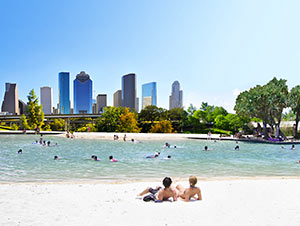BAYOU SWIMMING HOLE PROMOTERS JUMP TO KICKSTARTER TO JUMPSTART PROJECT  Just how feasible would it be to build a 3-acre self-cleaning swimming hole somewhere near the center of Houston, so you could take your own bathing-suits-and-skyscrapers pics like the one shown here — without resorting to Photoshop? If enough people donate to the Kickstarter for the Houston Needs a Swimming Hole campaign, you may get to find out. Promoters Monte Large, Evan O’Neil, and Jeff Kaplan are hoping to raise $30,000 from contributors for a feasibility study for their proposal — including a preliminary site selection component. The study would be conducted by Sherwood Design Engineers, whose Houston branch is a tenant in office space connected to Kaplan’s New Living store on Kirby Dr. The swimming hole, meant to serve as a centerpiece of Houston’s growing our-bayous-are-our-parks system, would be patterned on the natural swimming pool model common in Europe, where adjacent plant-filled “regeneration zones” filter the water, and no chemicals are needed. [Kickstarter; more info] Photo: Houston Needs a Swimming Hole
Just how feasible would it be to build a 3-acre self-cleaning swimming hole somewhere near the center of Houston, so you could take your own bathing-suits-and-skyscrapers pics like the one shown here — without resorting to Photoshop? If enough people donate to the Kickstarter for the Houston Needs a Swimming Hole campaign, you may get to find out. Promoters Monte Large, Evan O’Neil, and Jeff Kaplan are hoping to raise $30,000 from contributors for a feasibility study for their proposal — including a preliminary site selection component. The study would be conducted by Sherwood Design Engineers, whose Houston branch is a tenant in office space connected to Kaplan’s New Living store on Kirby Dr. The swimming hole, meant to serve as a centerpiece of Houston’s growing our-bayous-are-our-parks system, would be patterned on the natural swimming pool model common in Europe, where adjacent plant-filled “regeneration zones” filter the water, and no chemicals are needed. [Kickstarter; more info] Photo: Houston Needs a Swimming Hole




Do they have a climate like Houston’s anywhere in Europe? I’m skeptical about the feasibility of this.
Yes, there would seem to be some rather substantial physical hurdles here.
it should be built as an extension to buffalo bayou park and also why not make a small man made beach overlooking the city
I think this would be a great idea. For me it’s really feasible, an attraction right in the heart of the city will get the people going. People would be circulating through places right after they visit this place. If you would think about it, having this would be a benefit to all.
Jackie Macias — TRC, CDPE
Real Estate Agent
RE/ MAX Top Realty
Cell: (832) 573-7507
Fax: (713) 733-3311
Direct: (713) 558-2523
http://www.jackiemacias.com | jackiemacias01@gmail.com
@Spoonman So Houston might be too hot and humid for a swiming pool? How does that make sense?
To think, there are people in the city that built the first domed stadium that think an outdoor swiming pool isn’t feasible.
@Spoonman: Are you suggesting Houston doesn’t have the climate for outdoor swimming?
I really think too many people will just let their dogs jump in. I would like to see what “self cleaning” means. Will all of the mosquito larvae read signs telling them to stay out?
No chemicals? Good luck with that.
Well, the idea is that this isn’t a swimming pool, right? Wetlands are naturally filtered by plants in Houston’s climate, but their water sure doesn’t look like that. Maybe it would work, but “it works in Europe!” doesn’t mean it will work in Houston. At least they’re starting with a feasibility study.
Hope they are not making this free—it will be a sewer in less than a year.
I’m fine with Houston building a swimming pool as long as it is Not In My Back Yard!
.
Oh wait, a swimming pool in my back yard would be great.
@ J
I was wondering the same thing. How close could this get to the Bayou to see some of the alligators swim by to say hello? I mean, even being fenced in, they get into pools in Florida.
$30k for a “feasibility study”? First off, damn. Second, and then?
Jackie – I like your comment. Can you please share some additional contact info for a follow up?
Where would this even get built? West side is too expensive, central is too expensive and east end doesn’t yet have the pull for this
When a realtor tries to stuff their contact info in your face where it doesn’t belong, I like to sign them up for all the mega spam lists and random phone robocalls in the middle of the night.
Commensense is right. I can’t believe the moderator let this slime realtor post contact info.
This is an Outstanding idea!
Woohhoooo! I’ve finally found a realtor!
Run-off is a very tough thing to counter. A new stable-level body of water would be nice though, either way.
It needs to have two sections, like Buffalo Bayou does: one for the bums’ toilet and one for the bums’ bathing/laundry area.
Tear down the Astrodome, expand the playing field (which is already sub-grade) and call it Dome Lake. Plenty of parking already exists, so there is no need to spend a fortune on property acquisition. Sell the naming rights so Judge Emmett can save face and keep the memory of the Dome as part of our future.
If they can keep the alligators out, it may work!
What about ground floor retail ?
This is great, it will be just like Barton Springs in Austin!…. Oh wait, no, it will be a completely man made pool full of silty bayou runoff water with clouds of mosquitoes and that flesh eating virus ….. Sounds more like a scam to get a bunch of suckers to pay in 30k for “feasibility study” that those of us with shred of rationality already know the answer to.
Are you all really complaining about a commenter including his/her full name and contact information in a post!? Ha!
I’ll bite. Here’s a very simple engineering analysis.
Problems with stream-fed swimming pools in Houston are going to be three-fold:
1) Silt (in engineer-speak, Total-Suspended-Solids or TSS). See http://voclesspulping.com/photos/sedimentation-basin/image_preview
TSS is treated with sedimentation basins. That can be a large pool (that people don’t swim in) adjacent to the real pool. In water/wastewater treatment plants, a coagulant like alum is usually added to sedimentation basins to make TSS precipitate out quicker. If you’re going to do this with no chemicals, you’ve got to be willing to accept either VERY long treatment times, or only partially successful results. The tiny diameter of the clay particles that make up the TSS in our bayous just flat out won’t come out of suspension without a coagulant, so the water WILL be brown. It’s not necessarily a deal breaker – the water in Galveston’s brown too.
2) Bacteria (in engineer-speak, total coliform count). See http://www.cdc.gov/healthywater/drinking/private/wells/testing.html
Usually these are E.Coli, algae, and some protests. ALL streams/lakes/oceans in the entire world have this, even the cleanest and clearest. Realistically, to get an insurance policy to operate, the water’s going to have to be disinfected to some degree. That means chlorination (chemicals), ozonation (chemicals), or UV disinfection. More on UV in a minute.
3) Dissolved Oxygen content. You don’t want the water to turn an-aerobic. See http://en.wikipedia.org/wiki/Hypoxia_(environmental)#Aquatic_hypoxia
If there’s enough carbon-containing compounds dissolved in the water, the bacteria naturally in the water will eat it rapidly, causing the bacteria to use up all the oxygen that’s already dissolved in the water. This leads to any/all fish in the water suddenly dying off, as well as noxious smells and other really terrible stuff. You can make sure the dissolved oxygen doesn’t drop by filtering out carbon containing compounds (takes chemicals), or using aerators. A dual-way to solve the #2 and #3 issues is by passing the water over a very shallow (less than 6 inch deep) bed of rocks at a fast speed. Think rapids. This lets the water simultaneously re-oxygenate and also absorb huge amounts of UV. This might be the sort of silver bullet that makes this possible in Houston.
.
So: This is going to be expensive, but it’s probably do-able. However, the water is still going to be brown. Sorry.
Could they potentially use the same technology that they are talking about using in the floating pools in the Hudson?
http://www.pluspool.org/about/
Back in the day (1960’s) we had a place down on South Main called Gateway…..big swimming pool! Then in the 70’s we had a water park at Astroworld….both privately funded and gone now……How about just building a railway with a train that runs from Downtown to the beach in Galveston???? During the week it could handle commuters along the 45 area….
Ross, filtration is slow, expensive, and creates a lot of inconvenient waste. That’s all the New York pool (which doesn’t actually exist) is planning on using.
If filtration were easy, water treatment plants would be a lot simpler. But it’s just not the best way to clean lots of water.